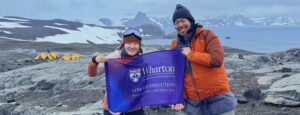When Tanya Paul started as an undergrad at Wharton, getting a PhD wasn’t part of her long-term plan. She initially aspired to work as a data scientist or analyst but soon fell in love with data in a whole different way through a research assistantship with Andy Wu, GR’15, and David Hsu.
Designed specifically for freshmen, this new research position was created to expose undergraduates to scholarly research early on and expand their potential career options. It clicked with Tanya right away.
“I discovered I really enjoyed the type of work I was doing, and I liked that research required both critical thinking as well as mathematical ability,” she said. “I thought it was a great intersection of economics and statistics.”
The Value of Mentorship and Collaboration
Tanya said mentorship had been a valuable resource for her since the beginning. Initially, Andy was her boss, but he took on the role of a mentor. “He suggested trying different types of research and connecting with specific professors, which helped me to navigate my path to the PhD program,” Tanya said. “He saw potential in me and encouraged me to consider research as a career.”
After Andy graduated, Tanya found two new mentors through the Wharton Society for the Advancement of Women in Business Academia (WSAWBA). “They’re both in the Finance department, and I have found it so useful to talk to them about my research to get an outside perspective,” she said. “There is value in understanding what other fields are doing, what they’re working on, and how can we apply similar techniques to accounting.”
That’s why Tanya also joined the board for the Mack Innovation Doctoral Association seminars (MIDAs). “I thought it would be interesting to get involved because innovation is not a very traditional topic in accounting, and it’s likely not something I would get exposed to within the department,” she said.
IDDEAS Promotes Diversity in Academia
Tanya also participated in the inaugural class of the Introduction to Diversity in Doctoral Education And Scholarship (IDDEAS) program. “It was a wonderful experience for me, even though I had been exposed to many of Wharton’s resources and research as an undergrad,” she said. “I loved the insights shared by faculty and PhD students that may not have been easy for me to talk to or reach out to otherwise. I especially thought that all the presentations regarding PhD prerequisites and how to get into a PhD program were incredibly helpful.”
Tanya also met a group of students with similar interests to her and was able to connect on that dimension. “It’s so important to have a program like this because a lot of the students were minorities and females, both underrepresented groups in academia. Being able to attend this program provided that stepping stone in understanding that academia is an option for us and gave us an idea of what it takes to get there,” she said.
Some people may think it’s a challenge to get a PhD after being in the workforce because you have to get back into the school mindset. “I’m on the other side of that — going into a doctoral program straight from undergrad presents its own challenges because the classes are fundamentally different,” Tanya said.
She discovered studying for a PhD is more open ended with fewer deadlines and requires a different way of thinking. “I’ve had to learn the art of refining my time management skills and structuring my day into segments where I work on different things so that I can track my progress and feel like I’m working toward measurable goals,” she said.
Working with Faculty One on One
“Since I’ve been in the doctoral program, I’ve learned what constitutes a ‘good’ idea,” Tanya said. “We’re really pushed to answer questions that have some economic meaning/impact — so our results aren’t just statistically significant, they should be economically significant in nature as well.”
How prominent is this phenomena in the real world? What general economic question does this specific setting answer? These are both questions that Tanya has learned to think about whenever thinking of a topic.
Right now, Tanya is working on a joint project with a faculty member focused on understanding how banks affect their borrowers’ information environment. “One of the main reasons I chose Wharton was because the faculty in the accounting department are very enthusiastic, active in research, and work closely with PhDs on projects,” she said.
“People are surprised when I tell them my class has only two students. I like the small environment. We get to know the faculty very well and get a lot of guidance.”
Posted: September 7, 2016


















